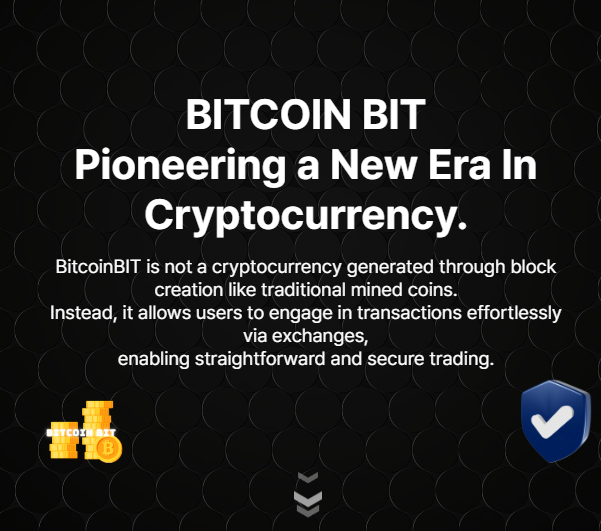
BitcoinBit (BCB) is revolutionizing blockchain technology with a unique approach that combines the timeless principles of decentralization and transparency with modern advancements in scalability and security.
Unlike traditional cryptocurrencies like Bitcoin, which rely on the energy-intensive Proof of Work (PoW) consensus mechanism, BitcoinBit introduces Proof of Stake (PoS) as its foundation. This shift not only reduces the environmental footprint associated with mining but also makes the network more scalable and accessible to anyone.
BitcoinBit's design is rooted in solving the structural inefficiencies that have plagued the PoW consensus models for years. By focusing on minimizing energy consumption and offering a more efficient transaction system, BitcoinBit promises to tackle the long-standing issues of scalability and accessibility.
The transition from PoW to PoS in BitcoinBit is a fundamental change that creates a more inclusive ecosystem while maintaining the core values of decentralization and security. In the following sections, we will break down the key features of BitcoinBit’s blockchain infrastructure and its implications for the future of cryptocurrency.
A Revolutionary Shift from Proof of Work to Proof of Stake
BitcoinBit’s shift from the traditional Proof of Work (PoW) to Proof of Stake (PoS) is a fundamental departure from the mining-heavy model that defines Bitcoin. While PoW requires participants to solve complex cryptographic puzzles through high-performance computing, PoS grants the right to validate transactions based on the number of coins a participant holds and is willing to "stake" in the network. This process eliminates the need for energy-intensive mining equipment, drastically reducing BitcoinBit’s energy consumption by up to 99%, making it a far more sustainable solution compared to Bitcoin’s PoW-based network.
The Environmental Impact of Proof of Work vs. Proof of Stake
In PoW systems like Bitcoin, miners use specialized hardware (ASICs and GPUs) to compete in solving cryptographic problems, leading to massive electricity consumption. Bitcoin, for instance, consumes tens of terawatt-hours annually due to this process, a significant portion of which comes from non-renewable energy sources. In contrast, PoS systems, such as BitcoinBit, rely on validators who stake their tokens to secure the network. This drastically lowers energy consumption, aligning with global sustainability and ESG (Environmental, Social, Governance) goals.
Here’s a simplified comparison of PoW and PoS:
PoW: Miners compete to solve complex problems, leading to high resource consumption and hardware centralization. The process is slow, with Bitcoin’s network capable of processing approximately 7 transactions per second (TPS).
PoS: Validators are chosen based on the amount of cryptocurrency they stake, and block creation is faster and more energy-efficient. BitcoinBit, for example, reduces its energy use by over 99%, supports faster block times, and can process transactions at a much higher rate.
By adopting PoS, BitcoinBit solves two major problems: scalability and energy inefficiency, while keeping the network decentralized and secure.
Enhancing Scalability Through Proof of Stake and Byzantine Fault Tolerance
BitcoinBit takes scalability to the next level by implementing a PoS-based system in conjunction with Byzantine Fault Tolerance (BFT), a consensus mechanism designed to ensure the integrity and reliability of the blockchain network even when some nodes might fail or act maliciously.
PoS and BFT: A Scalable Combination
In BitcoinBit’s PoS system, validators are selected randomly or in rounds, based on the proportion of coins they stake. This selection process is much faster and more efficient than PoW’s competitive mining. By using BFT protocols, such as Tendermint or Casper FFG, BitcoinBit can process transactions at a significantly higher speed and with greater reliability. This allows BitcoinBit to handle an increasing number of transactions per second (TPS) without the bottlenecks that PoW systems experience.
As a result, BitcoinBit supports an adaptive throughput adjustment mechanism that dynamically adjusts based on network load, allowing the system to scale as needed without compromising performance or security. The current network setup enables BitcoinBit to handle up to 1,500 TPS without relying on Layer 2 solutions, positioning it as a formidable competitor to other blockchain networks like Ethereum and Bitcoin.
User-Centric Network Accessibility: No Mining Hardware Required
One of the standout features of BitcoinBit is its user-centric design, which eliminates the need for expensive mining equipment or specialized hardware. Traditional PoW networks require miners to invest in costly ASICs or GPUs, making it difficult for average users to participate in network validation. BitcoinBit, on the other hand, allows anyone to participate in the network through staking. By staking BitcoinBit tokens, individuals can become validators, helping to secure the network and earn rewards without needing high-spec servers.
How Anyone Can Participate in BitcoinBit’s Network
To become a validator on BitcoinBit, users only need to stake a minimum amount of BCB tokens (e.g., 10,000 BCB). Validators are chosen based on their stake, and they play an active role in transaction validation and block generation. This makes BitcoinBit a truly decentralized network, as users from around the world can participate, regardless of their access to specialized mining hardware. The barrier to entry is significantly lower compared to PoW-based systems, which typically require a hefty investment in mining rigs and high electricity costs.
By allowing broader participation, BitcoinBit strengthens the network’s security and decentralization, preventing centralization of mining power in the hands of a few major players.
Security and Decentralization: Maintaining Network Integrity
BitcoinBit’s PoS-based model not only improves scalability but also enhances network security. In traditional PoW systems, miners must compete to solve cryptographic puzzles, creating a race that often leads to centralized control. BitcoinBit, however, uses a randomized validator selection process and imposes penalties (called “slashing”) for malicious or dishonest behavior, such as double-signing or submitting invalid blocks.
How Slashing Ensures a Secure Network
Validators who act maliciously or fail to maintain proper uptime can have their staked tokens slashed, providing a strong financial incentive to behave honestly. This ensures that BitcoinBit’s network remains secure while keeping the validation process decentralized. The use of randomness-based validator selection prevents any single entity from gaining undue control over the network, thereby maintaining the integrity and decentralization of BitcoinBit.
The Role of Smart Contracts and EVM Compatibility in Expanding BitcoinBit’s Use Cases
In addition to scalability and security, BitcoinBit integrates Ethereum Virtual Machine (EVM) compatibility, which allows developers to deploy Ethereum-based decentralized applications (dApps) and digital assets on its platform. By supporting Ethereum’s token standards (ERC-20, ERC-721, and ERC-1155), BitcoinBit fosters interoperability with other blockchain ecosystems, expanding its potential use cases in the DeFi and NFT spaces.
Building dApps and DeFi Protocols on BitcoinBit
BitcoinBit’s full support for Solidity and Ethereum-based dApps opens up new possibilities for decentralized finance (DeFi) applications, NFT marketplaces, and other digital services. With Ethereum’s dominance in the dApp space, BitcoinBit’s compatibility allows developers to easily migrate or deploy existing applications, tapping into the growing demand for blockchain-based services.
Moreover, BitcoinBit plans to integrate zk-Rollups and Layer 2 solutions, which will further enhance its scalability by reducing transaction costs and increasing throughput. These integrations will enable BitcoinBit to scale without overwhelming the main chain, ensuring efficient and cost-effective operations for users and developers alike.
A Token Economy That Drives Long-Term Engagement
BitcoinBit’s tokenomics is designed to support a sustainable and rewarding ecosystem. The BCB token not only acts as the native currency for the network but also plays a critical role in governance, staking, and securing the blockchain. With a fixed supply of 21 million coins, BCB has a deflationary structure that prevents inflation, ensuring long-term value preservation.
Governance and Incentives Through Staking
Holders of BCB tokens can participate in governance by voting on proposals related to network upgrades, transaction fees, and partnerships. Additionally, by staking their tokens, users earn rewards in the form of block rewards and transaction fees, creating an incentive for long-term participation in the network. The staking mechanism aligns the interests of validators and token holders, promoting the stability and growth of the ecosystem.
In The End
Looking forward, BitcoinBit plans to further enhance its ecosystem through several key initiatives. These include improvements to its scalability, further cross-chain integration, and the implementation of zk-Rollups for even greater transaction throughput. The development roadmap for BitcoinBit ensures that the network continues to evolve, adapting to new technological advancements while maintaining its core principles of decentralization, security, and sustainability.
As blockchain technology advances and the demand for more efficient, scalable, and secure networks grows, BitcoinBit’s unique approach will likely set a precedent for future projects. By combining Proof of Stake technology with cutting-edge scalability solutions, BitcoinBit is not only addressing the issues faced by earlier blockchains but also paving the way for the future of digital finance.
For most recent information and updates, visit:
Webiste: https://www.bitcoinbit.xyz/
Twitter: https://x.com/bitcoinbit_
Telegram: https://t.me/BitCoinBit_BCB
Author
Forum Username: Emily Barros
Profile Link: https://bitcointalk.org/index.php?action=profile;u=3481712
Wallet: 0xB2a7AFc4eFccf242FC5f9FD8726231cEbC83CCd5
